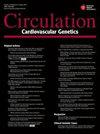在葡萄糖激酶调节蛋白抑制的情况下,生活方式干预对体重减轻和心脏代谢变化的影响:葡萄糖激酶调节蛋白- leu446pro变体
Q Medicine
引用次数: 6
摘要
背景:葡萄糖激酶调节蛋白(GCKR)抑制剂为糖尿病血糖控制提供了一种新的治疗方法;然而,它们的心脏代谢作用,特别是与甘油三酯和c反应蛋白(CRP)水平升高有关的作用值得关注。GCKR Leu446Pro是与GCKR功能降低、甘油三酯和CRP升高相关的常见变异。方法和结果:我们研究了1年的强化生活方式干预(ILI)减肥是否可以避免与GCKR Leu446Pro相关的不利心脏代谢作用,并与糖尿病支持和教育组进行了比较,这些超重/肥胖的伴有甘油三酯(n=3214)和CRP (n=1411)数据的2型糖尿病患者参加了一项随机减肥生活方式干预研究,糖尿病健康行动(Look AHEAD)。一旦将人口统计学、药物使用、基线肥胖和健康考虑在内,ILI并没有改变GCKR-Leu446Pro与总体样本和非西班牙裔白人中甘油三酯升高(&bgr;±SE=0.067±0.013,P=1.5×10−7和&bgr;±SE=0.052±0.015,P=5×10−4)或CRP升高(&bgr;±SE=0.136±0.034,P=5.1×10−5和&bgr;±SE=0.903±0.038,P=0.015)的基线相关性。与糖尿病支持和教育相比,1年后ILI缺乏保护作用(ILI与糖尿病支持和教育相互作用对甘油三酯和CRP变化的影响分别为:总体样本中P=0.64和0.37;在非西班牙裔白人中P=0.27和0.05)在对肥胖和健康变化进行额外调整后持续存在。结论:ILI对肥胖和健康的适度改善并没有减轻GCKR抑制对超重/肥胖糖尿病患者心脏代谢的不良影响。本文章由计算机程序翻译,如有差异,请以英文原文为准。
Lifestyle Intervention for Weight Loss and Cardiometabolic Changes in the Setting of Glucokinase Regulatory Protein Inhibition: Glucokinase Regulatory Protein-Leu446Pro Variant in Look AHEAD
Background—Glucokinase regulatory protein (GCKR) inhibitors offer a novel treatment approach for glucose control in diabetes mellitus; however, their cardiometabolic effects, particularly in relation to increased triglycerides and C-reactive protein (CRP) levels, are of concern. GCKR Leu446Pro is a common variant associated with reduced GCKR function, increased triglycerides, and CRP. Methods and Results—We investigated whether a 1-year intensive lifestyle intervention (ILI) for weight loss would avert the unfavorable cardiometabolic effects associated with GCKR Leu446Pro when compared with a diabetes mellitus support and education arm in overweight/obese individuals with type 2 diabetes mellitus with triglyceride (n=3214) and CRP (n=1411) data participating in a randomized lifestyle intervention study for weight loss, Action for Health in Diabetes Mellitus (Look AHEAD). Once demographics, medication use and baseline adiposity, and fitness were accounted for, ILI did not modify the baseline association of GCKR-Leu446Pro with elevated triglycerides (&bgr;±SE=0.067±0.013, P=1.5×10−7 and &bgr;±SE=0.052±0.015, P=5×10−4) or with elevated CRP (&bgr;±SE=0.136±0.034, P=5.1×10−5and &bgr;±SE=0.903±0.038, P=0.015) in the overall sample and Non-Hispanic Whites, respectively. The lack of a protective effect from ILI at 1 year when compared with diabetes mellitus support and education (ILI versus diabetes mellitus support and education interaction for triglyceride and CRP change, respectively: P=0.64 and 0.37 in the overall sample; P=0.27 and 0.05 in Non-Hispanic Whites) persisted after additional adjustment for changes in adiposity and fitness. Conclusions—Moderate improvements in adiposity and fitness with ILI did not mitigate the adverse cardiometabolic effects of GCKR inhibition in overweight/obese individuals with diabetes mellitus.
求助全文
通过发布文献求助,成功后即可免费获取论文全文。
去求助
来源期刊

Circulation-Cardiovascular Genetics
CARDIAC & CARDIOVASCULAR SYSTEMS-GENETICS & HEREDITY
CiteScore
3.95
自引率
0.00%
发文量
0
期刊介绍:
Circulation: Genomic and Precision Medicine considers all types of original research articles, including studies conducted in human subjects, laboratory animals, in vitro, and in silico. Articles may include investigations of: clinical genetics as applied to the diagnosis and management of monogenic or oligogenic cardiovascular disorders; the molecular basis of complex cardiovascular disorders, including genome-wide association studies, exome and genome sequencing-based association studies, coding variant association studies, genetic linkage studies, epigenomics, transcriptomics, proteomics, metabolomics, and metagenomics; integration of electronic health record data or patient-generated data with any of the aforementioned approaches, including phenome-wide association studies, or with environmental or lifestyle factors; pharmacogenomics; regulation of gene expression; gene therapy and therapeutic genomic editing; systems biology approaches to the diagnosis and management of cardiovascular disorders; novel methods to perform any of the aforementioned studies; and novel applications of precision medicine. Above all, we seek studies with relevance to human cardiovascular biology and disease. Manuscripts are examined by the editorial staff and usually evaluated by expert reviewers assigned by the editors. Both clinical and basic articles will also be subject to statistical review, when appropriate. Provisional or final acceptance is based on originality, scientific content, and topical balance of the journal. Decisions are communicated by email, generally within six weeks. The editors will not discuss a decision about a manuscript over the phone. All rebuttals must be submitted in writing to the editorial office.
 求助内容:
求助内容: 应助结果提醒方式:
应助结果提醒方式:


